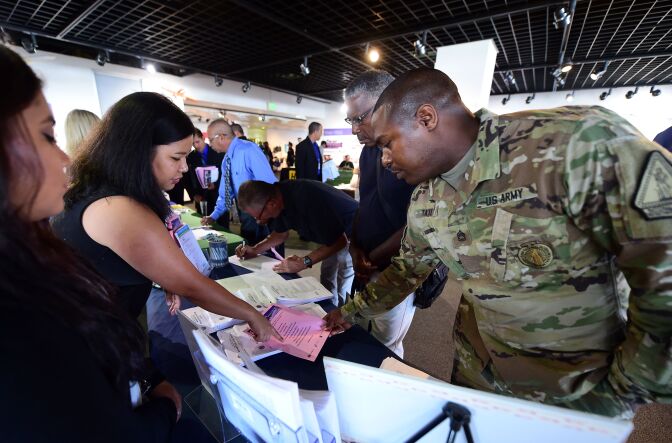This story is free to read because readers choose to support LAist. If you find value in independent local reporting, make a donation to power our newsroom today.
This archival content was originally written for and published on KPCC.org. Keep in mind that links and images may no longer work — and references may be outdated.
Minority veterans, ranks growing, need help with benefits and services

Racial and ethnic minorities make up an increasing share of the military, yet face added obstacles when seeking to access veterans benefits, according to a report from the Department of Veterans Affairs.
While the overall veteran population is expected to decline, the number of minority veterans will rise in coming decades, said Barbara Ward, director of the VA's Center for Minority Veterans and a contributor to the study.
"As the demographics change in the private industry in our nation, we're seeing similar changes in demographics in our active duty military as well as our veteran population," she said.
Currently, about 23 percent of U.S. veterans are minorities, according to the study, which projects that by 2040 they will comprise about 36 percent. In California, minorities already make up about one-third of veterans.
The study, called the Minority Veterans Report, finds that veterans who are black, Latino, Asian, Pacific Islander or Native American are less aware of benefits and face problems after military service, such as homelessness and chronic diseases, at higher rates compared with their white counterparts.
"If you don't go into the churches or go into the communities where they live, then you're not very likely to get that information directly to them," said Ward.
According to the California Department of Veterans Affairs, of the nearly 1.85 million veterans in the state, about 630,000 identify as an ethnic minority. That group is also less likely to access veteran benefits than non-minority veterans, according to the California VA - a finding consistent with the national VA report.
In addition to homelessness and chronic diseases, the report identified two other primary challenges facing minority veterans: awareness of VA benefits and unemployment.
That resonates with Othan Mondy, a 74-year-old African-American Naval Air Forces retiree in El Cajon.
"It gets to the point where individuals do not seek, or continue to seek, to receive claims," he said, adding that he's heard similar responses from his fellow veterans. "Rather than complete a claim, I'd just rather not go."
After a stroke, Mondy said he was frustrated by his attempts to find out if a wheelchair and special vehicle would be covered under his VA benefits. Though he eventually got the help he needed, the experience left him seeing a need for improvement.
"It's a communication problem," said Mondy. After joining the Navy back in 1962, he watched his career advance based on his merits, but the military, he said, is not immune from the same racial disparities that persist in civilian life. That can continue to be a challenge for minority veterans as they transition out of the armed services, he said.
African-Americans make up the largest group of minority veterans, at 52 percent in 2014, according to the VA report. Black veterans, along with Latinos (who currently make up 31 percent), are expected to show the largest growth over the coming two decades. Some groups, like the American GI Forum of California, seek to help Latino and other veterans through education.
Minority veterans also face challenges when trying to secure steady jobs. After leaving military service, they have a 44 percent higher risk of unemployment than non-minority vets, according to the report.
That's a key finding, said Anthony Williams, a retired Navy veteran who heads the Los Angeles chapter of the National Association for Black Veterans.
"People talk about PTSD, but a lot of it is, if I can get into the work force even close to my scope of responsibility, and the skill sets that I bring with me, then I'm a happier, productive guy," said Williams. "I deal with the stress better."
He said his group is focusing on entrepreneurship and expanding business opportunities for veterans.
The VA report calls for improving outreach programs for minority veterans and conducting more research into understanding why racial disparities persist with regard to chronic diseases.
But it also points to some successes, such as the fight against homelessness, where coordination between federal agencies and community groups has reduced the number of veterans on the streets in cities like Los Angeles.
What minority veterans are looking for is simple, said Mondy, who served in the Navy for 32 years.
"No more, no less than anyone else," he said. "Just give us a fair shake, that's all."
Though the government has released data on minority veterans in the past, this is the most in-depth look at the group, said Ward, who noted that it includes the often-overlooked history of minorities serving in the armed forces stretching back to the Revolutionary War.







